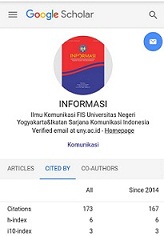Film as a mass communication media: Analysis of moral messages through Omar Hana's film
Surawan Surawan, IAIN Palangka Raya, Indonesia
Sayyidatul Hasanah, IAIN Palangka Raya, Indonesia
Siti Zaida Hanum, UIN Sunan Kalijaga Yogyakarta, Indonesia
Abstract
Morals are a very important element in a person's life because someone who has character means having a benchmark for the quality of his personality. Moral education can be instilled in various ways, one of which is through technological sophistication. Technology that can be said to be not new and growing rapidly is film. One of the films that entertain and educate today is the animated film, Omar and Hana. The purpose of this research is to analyze what are the values of moral education in the animated film Omar and Hana. This study uses a qualitative research approach with library research methods. The data sources used are primary data sources and secondary data sources. Data collection techniques used are observation and documentary techniques. The data analysis technique used the semiotic analysis of the Roland Barthes model. The results of this study indicate that the values of moral education contained in the animated films of Omar and Hana episodes "Start with Bismillah" and "Mission Fasting" which include: the value of gratitude, the value of amar ma'ruf nahi mungkar, the value of endeavour, the value of patience and angry value.
Keywords
Full Text:
PDFReferences
Abdurakhman, O., & Rusli, RK (2017). Learning Theory and Learning. DIDAKTIKA TAUHIDI: Journal of Elementary School Education , 2 (1).
Alawi, MA, Amalia, N., Anwar, Z., & Halim, IA (2022). Restraining Anger as a Form of Self-Control in the View of Hadith. The 3rd Conference on Islamic and Socio Cultural Studies (CISS) , 9 , 60–68.
Amalia, AC, & Munawir. (2021). The Concept of Humanistic Learning Theory in the Implementation of Islamic Religious Education Values. Aulada: Journal of Child Education and Development , 3 (2), 183–196.
Amin, M., & Fauzan, WN (2022). Islamic Da'wah Values in Riti-Riti Rituals to Improve Religious Aqidah. Syntax Literate: Indonesian Scientific Journal , 7 (5).
Anwar, R. (2010). Sufism morals . Bandung: Faithful Pustaka CV.
Armedyatama, F. (2021). Humanistic Learning Theory and Its Implications in Islamic Religious Education Subjects. An-Nuha: Journal of Islamic Religious Education , 1 (1), 11–19.
Azhar, A. (2022). Implementation of Amar Ma'ruf Nahi Mungkar in Social Life Based on Study of Al-Qur'an Surah Ali Imran Verses 104, 110 and 114. Journal of Education Ar-Rasyid , 7 (1), 1–16.
Bahri, S., & Abbas, BH (2020). The position of Dakwah and Amar Ma'ruf Nahi Munkar. Al-Ubudiyah: Journal of Islamic Education and Studies , 1 (2), 17–22.
Bunganegara, MH, & Ali, M. (2022). Satan in Human Blood Flow Perspective of the Hadith of the Prophet SAW (Psychological Approach Analysis). Ushuluddin Journal , 24 (1), 58–72.
Fauzan, A. (2022). The Relationship between Prayer and Effort in the Perspective of the Qur'an. Journal of Semiotics-Q: Study of the Science of the Qur'an and Interpretation , 2 (1), 54–78.
Wisdom, AN, & Partono. (2020). A Muslim's Physical and Spiritual Efforts to Face the Covid-19 Outbreak. Tarbawy : Journal of Islamic Education , 7 (2), 88–98.
Husnaini, R. (2019). Hadith on Controlling Anger in a Psychological Perspective. Diroyah: Journal of Hadith Science , 4 (1), 79–87.
Insani, FD (2019). Abraham Maslow and Carl Rogers' Humanistic Learning Theory and Its Implications in Learning Islamic Religious Education. As-Salam: Journal of Islamic Legal Studies , 8 (2), 209–230.
Karolina, A., Yustika, M., Arcanita, R., & Sari, RP (2022). Amar Ma'ruf Nahi Mungkar in a Review of Islamic Education (Studies on QS Ali Imran: 110). Guau: Journal of Amar Ma'ruf Nahi Mungkar , 2 (2), 219–228.
RI Ministry of Religion. (2019). The Qur'an and Its Translation . Jakarta: Lajnah Pentashihan Mushaf Al-Qur'an.
Malisi, MAS (2017). Challenges of Islamic Education in the MEA Era. Transformative Journal (Islamic Studies) , 1 (1), 1–15.
Muhibbin, & Marfuatun. (2020). The Urgency of Maslow's Hierarchy of Needs Theory in Overcoming Academic Procrastination Among Students. Educatio: Journal of Educational Sciences , 15 (2), 9–20.
Mujib, Z., & Suyadi. (2020). Humanistic Theory and Implications in PAI Learning at the Yogyakarta Al-Qur'an Science High School. Journal of Islamic Education , 4 (1), 11–23.
Mutaqin, MZ (2022). The Concept of Patience in Learning and Its Implications for Islamic Education. Journal of Islamic Education: The Teacher of Civilization , 3 (1), 1–16.
Nasirudin. (2017). Anger in Islamic Education. Nadwa: Journal of Islamic Education , 11 (2), 223–250.
Rachmadi, AG (2019). Gratitude: A Comparative Study of the Perspectives of Western Psychology and Islamic Psychology. PSYCHOLOGY: Journal of Psychological Thought And Research , 24 (2), 115–128.
Rohman, A., Majid, MS, & Nasution, A. (2022). Moral Education from the Perspective of Imam Qusyairi and Implementation in Education. Al-Fikra: Islamic Scientific Journal , 21 (1), 1–11.
Rosmanidar, E. (2019). Value of Endeavor Philosophy in Islamic Economics. Profit: Economics and Banking Studies , 3 (1), 1–13.
Saidah, & Muslimah. (2022). Problems and Solutions for Supervision of Orphanage Children's Morals. Journal of Syntax Transformation , 3 (8), 1116–1125.
Sanusi, A., Hamdanah, H., & Surawan, S. (2021). Internalization of Religious Education for Youth Through Majlis Ta'lim. Al-Fikri: Journal of Islamic Education Studies and Research , 4 (2), 117–126.
Sumantri, BA, & Ahmad, N. (2019). Humanistic Learning Theory and Its Implications for Learning Islamic Religious Education. Fondatia: Journal of Basic Education , 3 (2), 1–18.
Surawan, S., & Athaillah, M. (2021). Islamic education science. K-Media.
Surawan, S. (2020). Dynamics in Learning (A Study of Educational Psychology). Yogyakarta: K-Media.
Surawan, S., & Mazrur, M. (2020). The Psychology of the Development of Religion: A Stage in the Development of Human Religion . Yogyakarta: K-Media.
Surawan, S. (2019). Patterns of Internalization of Muhammadiyah Family Islamic Values and Abangan Islam. Journal of Hadratul Madaniyah , 6 (2), 35–43. https://doi.org/10.33084/jhm.v6i2.1265
Sheikh, AK (2019). Reconstruction of the Meaning and Method of Application of Amar Ma'Ruf Nahi Munar Based on the Qur'an. Al-Idahrah: Journal of Islamic Management and Administration , 2 (2), 1 -22 .
Wathoni, LMN (2020). Sufism Morals: Exploring Self-Holiness . Central Lombok: Aswaja Youth Forum.
Yusuf, M. (2017). Patience in Islamic and Western Perspectives. AL-MURABBI: Journal of Islamic and Educational Studies , 4 (2), 233–245.
DOI: https://doi.org/10.21831/informasi.v53i1.55458
Refbacks
- There are currently no refbacks.
Copyright (c) 2023 M. Ali Sibram Malisis, Surawan Surawan, Sayyidatul Hasanah, Siti Zaida Hanum
Supervised by
Our Journal has been Indexed by:
Informasi by http://journal.uny.ac.id/index.php/informasi is licensed under a Creative Commons Attribution-NonCommercial 4.0 International License.














